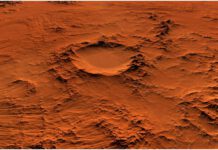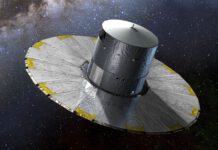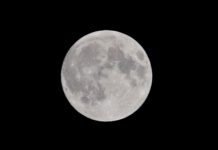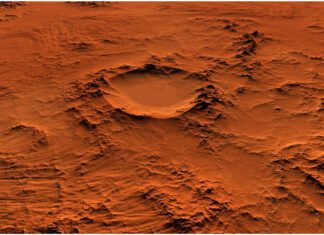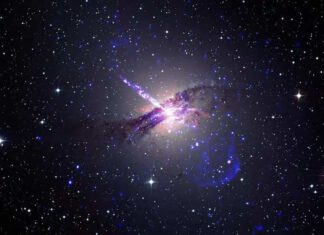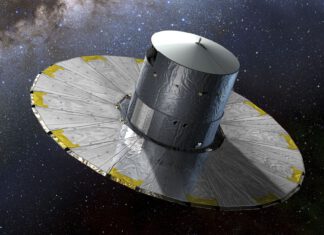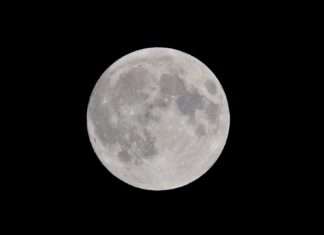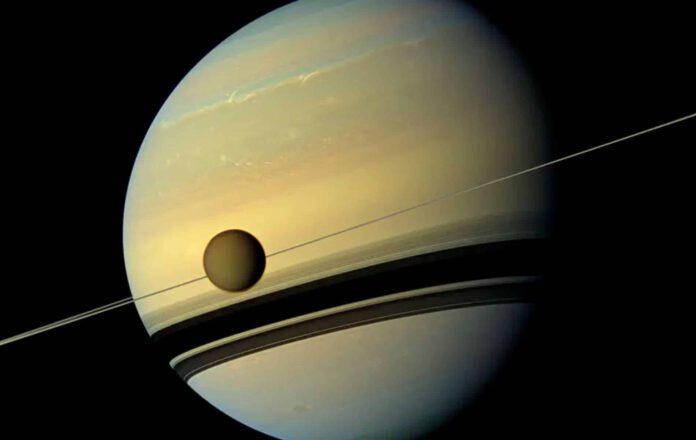
The Enigma of the ‘Magic Islands’ on Saturn’s Moon Titan
About a decade ago, the Cassini space probe uncovered the ‘magic islands’ on Ligeia Mare: one of the larger lakes of Saturn’s moon Titan. These islands appear and disappear, and their origin remains a mystery. However, American researchers now believe they have an explanation for this phenomenon.
According to the scientists, these ‘magic islands’ are large, floating chunks of organic material. These chunks are frozen and extremely porous. As a result, they can float on the surface of Titan’s lakes for a while before sinking. The researchers published their findings in the Geophysical Research Letters journal.
The Magic Islands on Titan
The study investigates the so-called ‘magic islands’ on Saturn’s moon Titan. The term ‘magic islands’ understandably sparks a lot of curiosity since these seemingly small islands appear and disappear out of nowhere.
The Cassini space probe, which spent several years studying Saturn and its moons, helped scientists catch these magic islands in action. The probe repeatedly captured images of the same section of Ligeia Mare – a large lake near Titan’s North Pole. Researchers noticed something startling when comparing these images. In 2013, a sudden 260 square kilometer patch emerged, which wasn’t visible in the 2007 footage. By 2014, this sizable patch had vanished without a trace.
What exactly was going on? Scientists racked their brains over it. Some theorized they were waves, while others suspected bubbles. However, new research suggests a different explanation. They presume the ‘magic islands’ are made up of organic materials.
Understanding the Mystery
To comprehend this, we first need to understand more about Titan. This moon has an atmosphere and lakes, which at first glance makes it somewhat reminiscent of Earth. However, the differences couldn’t be more significant. For example, Titan’s lakes are not filled with water, but with methane and ethane. The moon’s atmosphere isn’t just 50% thicker than Earth’s but is also rich in methane and other carbon-based or organic molecules.
Especially in the upper regions of Titan’s atmosphere, the density of these organic molecules is high. Here, the molecules can easily clump together, freeze, and fall to Titan’s surface, including its lakes. This notion led researcher Xinting Yu to propose, “What if the ‘magic islands’ could be organic material floating on the surface, like pumice floating on the water here on Earth before eventually sinking?”
Saturated Lakes and Frozen Organic Material
Yu and his colleagues decided to investigate whether falling clumps of organic material could indeed float and not immediately dissolve in the lakes. Their findings ruled out dissolution as the lakes are saturated with organic particles, making it implausible that solid organic substances would dissolve upon reaching the lakes filled with liquid methane and ethane.
However, could these chunks of frozen organic particles remain afloat, thereby posing as temporary islands? A valid question, considering the lakes on Titan mainly contain methane and ethane. Both liquids have a limited surface tension, making it harder for solid materials – like organic clumps – to stay afloat. Modelling reveals that most frozen organic clumps have a density too high to float on Titan’s lakes, unless they are highly porous. Researchers hypothesize that if the icy clumps are large enough and contain many narrow gaps and tunnels – resulting in a very limited density – liquid methane might slowly seep into such an icy clump, allowing it to float for some time.
Clumping Together
However, it’s worth noting that individual clumps – like those born high up in Titan’s atmosphere – are likely too small to float on their own. If many of these clumps come together near a lake’s shore, larger pieces might break off and drift away – a process somewhat similar to calving glaciers on Earth. If such a significant chunk of clustered organic material has the correct porosity, nothing theoretically stops it from being mistaken for a floating island by space probes like Cassini.
Has the Mystery Been Solved?
Perhaps, but future research is needed. Should the researchers’ hypothesis be correct, they may have solved not just one, but two mysteries about Titan. Scientists have also long wondered why Titan’s lakes and seas are unusually smooth. As per the researchers’ new study, this could be due to a thin layer of frozen organic molecules that rest on top of these lakes and seas. More to be revealed, undoubtedly.

